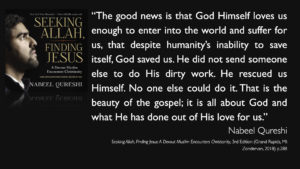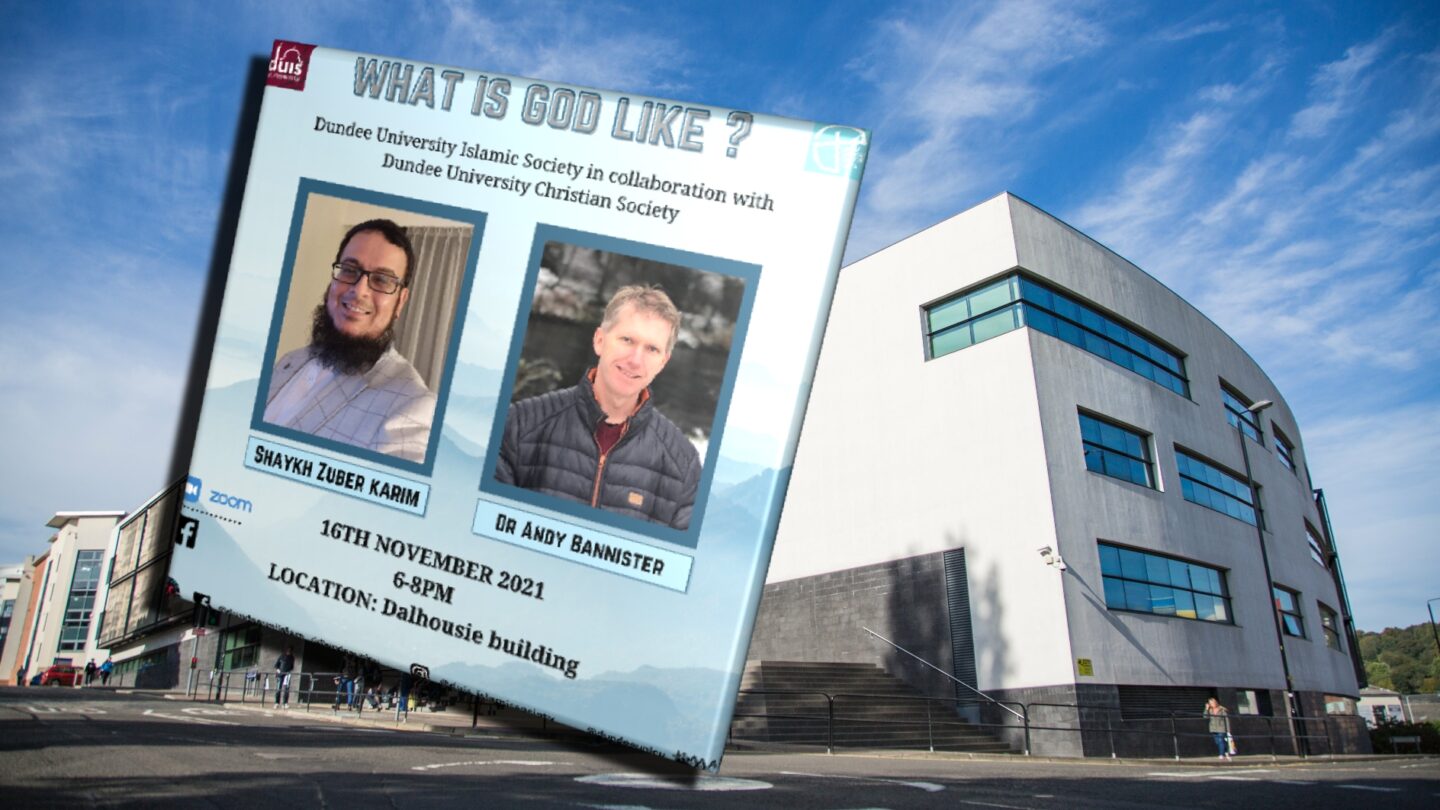I had the privilege of speaking at a joint event at the University of Dundee, hosted by the Christian Union and the Islamic Society. The evening was built around a dialogue between myself and a local Imam, Shayk Zuber Karim from the Al Maktoum Mosque. They gave us the really helpful title, “What is God like and how can we know?”
Zuber spoke first, and outlined the Islamic view of God, and explored that for twenty minutes or so, ending with some criticisms of the Bible. That was great – because it made the whole discussion a bit sparkier!
Then I was invited to speak for twenty minutes. I drew on my book and talked about the Christian view of God who is knowable, relational and who is love. I cited Muslim scholars who say that ‘Allah’ is none of those things.
Then we were invited to ask each other some questions. Zuber’s main line of questioning seemed to want to drive a wedge between the idea of a ‘God of love’ and a ‘God of Justice’ in Christian thought, suggesting that there is a contradiction there. I thought that was a very helpful question actually because it enabled me to expose a common misunderstanding that love is the opposite of justice. In fact, the opposite of love is apathy not justice! God’s justice exists because he cares deeply about this world and sees the harm that we have done to it, and one another – and so he is compelled to respond.
We then had a fascinating discussion about whether ‘love’ is something which can be earned. In the Qur’an over half the references to God and love refer to people Allah does not love (the unfaithful, the rebellious, the prodigal) and the other half are conditional, saying that God will love you if you meet certain requirements. I was surprised that Zuber tried to explain this by saying that if you have a compliant child and a rebellious one, you will obviously love the compliant one more! But those of us who are parents, who have experienced this – don’t love our kids any differently! We might parent them differently, but that’s because we love them equally.
Our discussion then applied the same ideas to the concept of ‘forgiveness’. In Zuber’s view, forgiveness is something which must be earned. I disagreed with that and argued that forgiveness does have a cost – but in true forgiveness that cost is borne by the forgiver, not the forgiven party. If I offended my wife, and apologised – and she agreed to forgive me on the basis that I completed a list of chores around the house; that wouldn’t be forgiveness, that would really be economics; closing a deal!
Then we went to audience Q&A, which I always enjoy. The university still had some Covid-restrictions in place, so there were only 40 people in the room; everyone else had to watch online. The audience was about 50% Muslim and 50% Christian and something like 30 questions were posted into the Sli.do forum for the event. My favourite question was the one we ended with, which was; “What is the purpose of life?” I went into my answer through the famous line in the Shorter Catechism that the ‘chief end of man is to glorify God and enjoy Him forever”. That led into the comparison of the Islamic and Christian visions of heaven or paradise. The Islamic one features food, drink and women to be enjoyed by the men; but the Bible (Rev 21) sees a deep relationship with God himself as the great prize of heaven. Zuber, and some of the Islamic students tried to say that these things in the Qur’an were only metaphors; but there’s good evidence that they are seen literally in the Qur’an and in the following centuries of Islamic scholarship. In fact, there is a vast amount of writing about the sexual aspect of heaven including debates about whether men would be given supernatural strength to have more sex with more women than possible on earth. Clearly they didn’t mean metaphorically…!
In an entirely unplanned development, my final slide stayed up above the stage for the whole of the 2nd half of the event. It was of a quote by my late friend Nabeel Qureshi, who converted from Islam to Christianity about why he had found the person of Jesus so attractive. Several students asked me about that at the end of the event.

After the formal Q&A there was lots of informal Q&A at the end. Two young Muslims engaged me in dialogue for a long time, and made derogatory comments about the Bible. The problem they had was that they had never looked at the history of the Qur’an, how it was composed and put together with manuscript variants evident to scholars.
It was such a good evening to be part of, and I was hugely grateful to the CU and the ISOC for extending the invitation to me. Obviously I want Muslims to hear the gospel of Christ. But also, I really want Christians and Muslims to meet one another, make friends and keep talking!
CU President Nathan Legg said, ““We were excited to collaborate with our friends in the Islamic Society as we felt there was a good discussion to be had around the differences in our faiths. It was refreshing to engage with a group of people who, though they didn’t agree with us about who Jesus was, had a great interest in him and were keen to engage in dialogue about him. We were glad to be able to offer them the Christian perspective and respectfully challenge some of their ideas surrounding Jesus.
I feel that the event was thoroughly enjoyed by everyone involved and it was a great benefit to have Andy Bannister offer his insights on both Christianity and his academic work on Islam. The event was a great success with dozens of questions being asked during the Q&A and even after the event, we would definitely be keen to put on more events like this in the future!”


